“Life was unfair to me and living as a victim was an option, but I chose to turn my pain to purpose, and success was the result.”
Jeevitha Kandasamy
Founder, Newlook Herbs
Salem, Tamil Nadu
https://newlookherbs.in/
Ditty Maria Dominic, Bhuvana N and Alagu Niranjan D recently interviewed Jeevitha Kandasamy from Salem, Tamil Nadu, to understand how she established a thriving venture by making herbal products from a small home-based unit.
|
Newlook Herbs is an authentic traditional skin and hair care brand, deeply grounded in the ancient principles of Ayurveda, founded by Jeevitha Kandasamy in 2020 at Salem, Tamil Nadu. The brand’s unwavering commitment is directed towards creating top-notch skin and hair care solutions, meticulously formulated from the finest herbal elements. |
Could you provide us with a brief overview of your educational and cultural background?
At the tender age of one, my father succumbed to cancer, leaving me as my mother’s only child. So, since childhood, I dreamed of becoming a doctor and helping cancer patients. However, fate took a different course, when I got into a road accident. My health condition posed challenges to my studies and I couldn’t complete my schooling. Consequently, in 2010, at the age of 19, I got married. My husband lived in a rural village, approximately 25 kilometres away from Salem. Transitioning from my home in Puducherry to this new environment proved to be an arduous journey. Yet, my husband’s unwavering support encouraged me to undertake a diploma course in Computer Science. At that time, he managed an institute that undertook project works and I subsequently joined the institute after completing the course. It was during this period that I dedicated myself to acquiring computer skills along with expanding my knowledge on many other topics, including medicinal properties of herbs.
Due to my father’s cancer-related demise, I found myself driven to provide assistance to cancer patients in whatever capacity I could. I took it upon myself to accompany the cancer patients from my village during their visits to JIPMER Pondicherry, for consultations. The reason for this was that many villagers faced challenges in communicating with doctors, as most of the doctors were North Indians who spoke in Hindi or English. During those hospital visits I used to see a large number of cancer patients which really saddened me. I firmly believe that our lifestyle choices play a major role in the development of cancer. In today’s world, it’s apparent that people are exposed to many chemicals through the various products they use in their day-to-day lives, which causes cancer. So, I began thinking of what I could do to reduce chemical use, though the idea of being an entrepreneur never occurred to me at that time.
When did the realization of your entrepreneurial aspirations first dawn upon you?
The profound sorrow I experienced at that period of my life became the catalyst for my journey into entrepreneurship. It began when I conceived in 2019 after an 8-year struggle with infertility due to gynaecological issues. The moment of conception felt surreal, especially after undergoing various treatments. During this period, I delved into educating myself about childbirth and child development. That’s when I realized the importance of minimizing chemical exposure in my child’s life. This led me to the idea of crafting a chemical-free soap for my unborn baby, considering that the very first act is usually bathing the baby, even before the introduction of solid foods.
Lacking prior experience in soap making, I turned to YouTube tutorials, and attempted to create soap through trial and error. Unfortunately, my initial attempts failed due to improper ingredient proportions, causing a burning sensation in my eyes. Frustrated by these setbacks, I realized that the standard proportions from YouTube weren’t suitable for my needs. Consequently, I enrolled in a local soap making class and visited soap factories, which enabled me to grasp the correct ratios of ingredients.
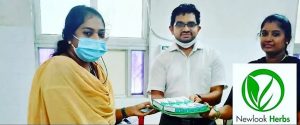 Distributing herbal soaps to Kirumappakkam PHC
Distributing herbal soaps to Kirumappakkam PHC
I incorporated marigold flower extract, readily available in my village that is renowned for its skin benefits, into the soap formula. Through continuous testing and refinement, I began to perfect my soap recipe, driven by the intention of creating the best possible product for my child. However, in September 2019, tragedy struck, as I lost my child due to complications. This devastating loss plunged me into a state of depression. Amidst this emotional turmoil, the onset of the COVID-19 pandemic compounded our challenges as my husband lost his job.
But the pandemic intensified the importance of hygiene. As messages promoting hand washing and cleanliness were gaining prominence, I couldn’t help but wonder about the chemical content in the soaps being used. This compelled me to distribute my chemical-free soap within my neighbourhood and to anyone seeking an alternative. Encouragingly, I received positive feedback, with one neighbour reporting a significant reduction in skin rashes after using my soap. These responses ignited my motivation.
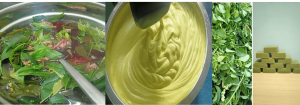 Preparation of herbal shampoo, Muringai seed oil night cream and kuppaimeni (Acalypha indica) based herbal pet soap
Preparation of herbal shampoo, Muringai seed oil night cream and kuppaimeni (Acalypha indica) based herbal pet soap
Simultaneously, I was an active participant on Clubhouse, discussing my soap-making endeavours, herbal remedies, and the significance of minimizing chemical exposure. The connections I formed on Clubhouse and the genuine interest shown by thousands of listeners boosted my self-confidence. This newfound confidence inspired me to believe that if I could capture people’s attention through dialogue, my chemical-free soaps would also resonate with them.
So, in 2020, I made the decision to turn soap-making into a business venture. This step not only provided a means to overcome financial constraints but also offered a path toward healing and resilience.
How was the journey once you decided to start your enterprise?
I started my enterprise in my home with an investment of INR 5,000. Soon I realised that I only knew how to make soap but had no idea of diversification, packaging and marketing. At that time one of my connections from Clubhouse was attending a conference and asked me whether I can help them in making moringa leaves (Moringa oleifera/ drumstick leaves) based herbal products to sell in their stall. I had never thought of making soaps using moringa leaf extract, but as per their request I made it and went for the conference. There were moringa farmers, retailers, exporters, researchers and other officials there but I was the only one with Moringa soap. I was astonished to see the demand for Moringa, especially in the export market. Many moringa leaf producers and dealers came to me asking if I can make soap if they provide me with the raw material.
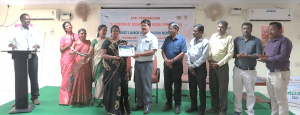 Receiving certificate from EDII Periyakulam for successfully completing the incubation
Receiving certificate from EDII Periyakulam for successfully completing the incubation
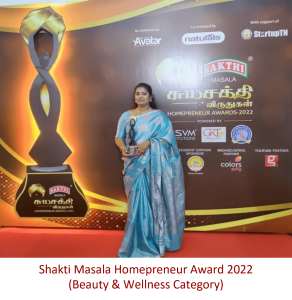 Another event that gave me a sense of direction is the agripreneurship development session conducted by the Entrepreneurship Development Institute of India (EDII) under the Periyakulam Horti-Business Incubation Forum. The class gave me an idea of the importance of diversifying my products and developing unique products. Now I am a member of the forum. So, in essence the journey has been good so far and my brand is getting recognized by more and more people as each day passes. In August 2022, I got ‘Sakthi Masala Homepreneur Award’ in the beauty and wellness category.
Another event that gave me a sense of direction is the agripreneurship development session conducted by the Entrepreneurship Development Institute of India (EDII) under the Periyakulam Horti-Business Incubation Forum. The class gave me an idea of the importance of diversifying my products and developing unique products. Now I am a member of the forum. So, in essence the journey has been good so far and my brand is getting recognized by more and more people as each day passes. In August 2022, I got ‘Sakthi Masala Homepreneur Award’ in the beauty and wellness category.
Currently what are all the products you have, and how do you procure the raw materials for it?
I have around 13 products which include eight types of herbal soaps, one herbal shampoo, two creams and two types of oils. Each of my products has a story behind its crafting. The soaps we make are cold pressed and the base is made of oils. This is different from the soaps we generally get in markets as those are ‘melt and pour’ soaps that uses petroleum products as base. Compared to ‘melt and pour’ soaps, our cold pressed ones take more time to make. It takes around 45 days to make a batch of soap. Another peculiarity of our soap is that we use six oils viz., coconut oil, rice bran oil, castor oil, food grade palm oil, illupai and punga oil in soaps, while usual soaps are made with a single oil which makes skin dry. So there is a lot of research that goes into finding the right ingredients and developing new products. One of the bestsellers that I developed by researching is the night cream made by mixing moringa seed oil and turmeric essential oil. Through my research on moringa seed oil I got to know it reduces ageing by 7 times and this motivated me to make moringa soap.
 The diverse range of products from Newlook Herbs
The diverse range of products from Newlook Herbs
Likewise, the oil and cream made for psoriasis treatment from Veppalai (Wrightia tinctoria) are two other bestselling products; and formulations of these products is our trade secret. The story of how these products were developed is interesting. In my village Veppalai is found in abundance. So before even starting my business, just out of interest, I had been researching and learning about it. Veppalai is hailed for its qualities in treating dry skin. So, in the initial days of my enterprise, on a regular visit to a home for handicapped children, I got a request from the teacher of the home to make a skincare product that will help in reducing the dryness of the knee and elbow joints of these kids. Most of the kids were unable to walk on their feet and their crawling movement caused chafing of knees or elbows on the floor. This caused intense drying and itching. So, I made an oil and cream using Veppalai for them, and it was very effective. So, I started to make it for sale under my brand. Once while I had put a stall in an expo, a girl came to me asking for any products that can cure her psoriasis. I suggested that she use my psoriasis cream made from Veppalai. Though I couldn’t guarantee that it would cure her psoriasis, I hoped that it would help to some extent. But to my astonishment she called me after three months and told me that her psoriasis had been cured completely. So currently, my main products are psoriasis cream and psoriasis oil.
I don’t add any chemicals in my products, though I use a minimal amount of preservatives. I have many customers in France, Germany, Malaysia and Singapore who are regular buyers of the oils and creams.
Except for veppalai oil, I procure all other raw materials from known farmers in my village. I make veppalai oil in my own unit at home, as farmers don’t make it and it is not available. I have around 10 regular farmers who supply raw materials to me.
How do you market your products?
Majority of the marketing is done through digital marketing. I have a website for my enterprise through which customers can learn more about our products and there’s a Whatsapp number to place orders. Also, we have an account on Instagram and we get orders through that as well. I also supply to other companies for selling through white labelling. Putting stalls in expos is another major way I market my products. Now I have started marketing my products in kits, with each kit holding different products of the customer’s choice. This has helped me to sell even more.
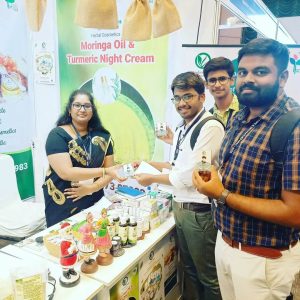 Exhibiting the products at Tamil Nadu Startups and Incubators Meet 2022
Exhibiting the products at Tamil Nadu Startups and Incubators Meet 2022
How do you think digital platforms are helping your enterprise and what are the challenges you face in using these platforms?
The comfort of sitting in your own space and reaching hundreds of people is the biggest advantage that digital platforms provide. I would say digital platforms, such as Clubhouse, helped me in networking and learning. When I went for the conference that I mentioned earlier, people identified me from Clubhouse. Also, marketing would have been a major hurdle without digital platforms such as Whatsapp, Instagram and Websites. If I am able to successfully market my products all over India and foreign countries, that’s only because of digital platforms.
But I have faced many challenges as well in digital marketing. Even though I was posting regularly about my products on social media, my products were not getting any popularity. In the incubation that I attended this aspect was not taught. So, I had to take an online digital marketing course. The class helped me in getting ideas on how to reach more customers through digital platforms. Paid promotions in social media are very popular but the amount of money influencers and celebrities ask for promoting products is huge, and I cannot afford that.
 Newlook Herbs Website
Newlook Herbs Website
Also, digital platforms pose another challenge – greater competition. For instance, if we see Instagram reels, there are hundreds of brands making soaps, lip balms, etc. If they are ready to invest, they can do paid promotions with influencers who have large numbers of followers. Whether it is a quality product or not, these influencers are trusted by many and they all will buy the products. So, if an entrepreneur is not able to promote the products and compete in digital spaces it is hard to thrive. Other challenges that I could have faced was in website development and designing of posters to put on social media. But luckily for developing the website I got help from my family members who were developers, and for designing posts, the basics I had learned during my diploma classes helped. I use Canva app for designing posters to put on social media platforms.
What is your message to aspiring women entrepreneurs?
In a world where being a woman often invites scepticism and challenges to one’s capabilities, it’s essential not to rely on external validation or anticipate immediate trust from others, especially in a country like India where establishing credibility can be an uphill battle for women. Instead, have confidence in your own abilities and then set out to pursue your entrepreneurial aspirations. However, it’s important to be thoroughly equipped to tackle the obstacles that may arise. Luckily, in this age of digital advancement, solutions are readily accessible at our fingertips for any challenge that we may face. Ensure that you are digitally literate. Prioritize continuous skill enhancement and commit to a journey of ceaseless learning, as staying updated is the cornerstone for achieving success.
Acknowledgement: This interview was done as part of the IRRI-CRISP ongoing project ‘Mapping of Good Practices in Digital Innovations in India Supporting Women Agrientrepreneurs’.
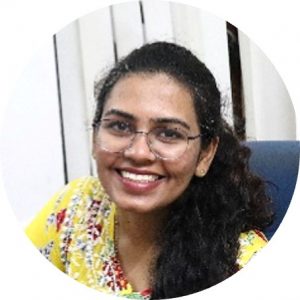 Ditty Maria Dominic, is a Research Fellow at the Centre for Research on Innovation and Science Policy (CRISP), Hyderabad, Telangana, India. She can be reached at: ditty794@gmail.com
Ditty Maria Dominic, is a Research Fellow at the Centre for Research on Innovation and Science Policy (CRISP), Hyderabad, Telangana, India. She can be reached at: ditty794@gmail.com
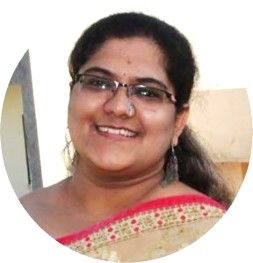 Bhuvana N, is a Consultant at the Centre for Research on Innovation and Science Policy (CRISP), Hyderabad. She has a PhD in Agricultural Extension, from Professor Jayashankar Telangana State Agricultural University, Hyderabad. Her research interests include organizational ecosystems and effectiveness, social networks and technological change. She can be reached at: bhuvanaditya7@gmail.com
Bhuvana N, is a Consultant at the Centre for Research on Innovation and Science Policy (CRISP), Hyderabad. She has a PhD in Agricultural Extension, from Professor Jayashankar Telangana State Agricultural University, Hyderabad. Her research interests include organizational ecosystems and effectiveness, social networks and technological change. She can be reached at: bhuvanaditya7@gmail.com
 Alagu Niranjan D, is a Research Fellow at the Centre for Research on Innovation and Science Policy (CRISP), Hyderabad, Telangana, India. He can be reached at: dan131995@gmail.com
Alagu Niranjan D, is a Research Fellow at the Centre for Research on Innovation and Science Policy (CRISP), Hyderabad, Telangana, India. He can be reached at: dan131995@gmail.com

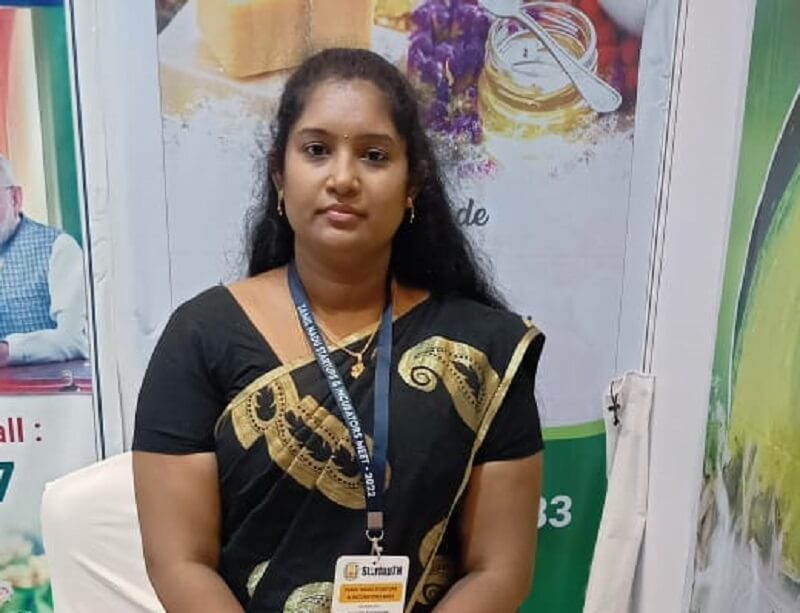

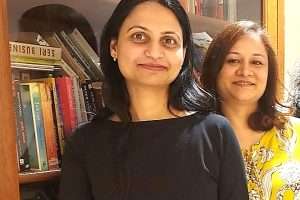

Add Comment